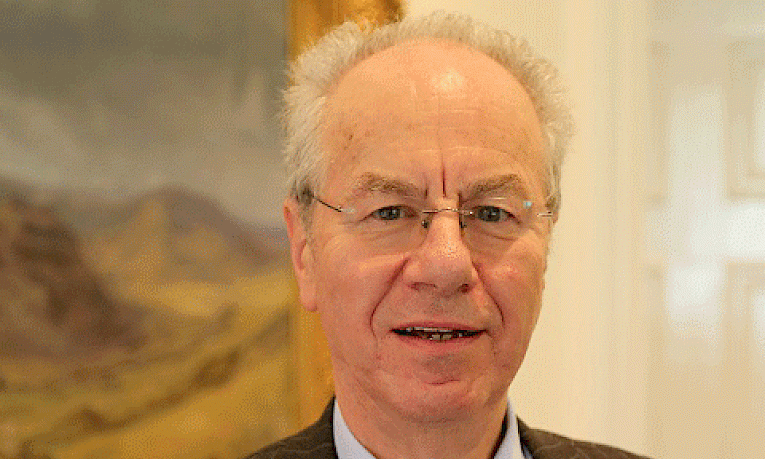
Peter Kellner, President of the polling company YouGov, gave up his valuable time - with just 50 days to go before the general election - to talk to the Society about who might govern Britain after May 7th.
Sorry: IE8 cannot display our video content.
While the polls had been broadly static since October last year, Peter noted that there had been a shift towards the Conservatives over the past three weeks with the Greens and UKIP down modestly.
A uniform swing projection would put Labour as the largest party, though with 80-100 seats set to change hands at this election, making such predictions is fraught with difficulty. Moreover, Peter noted that there are two clear historical patterns in the run up to elections we must be aware of: first, the Conservative support tends to improve whereas Labour loses out, and second the Liberal Democrats have tended to gain ground in the weeks before elections as they receive similar coverage under broadcasting rules to the larger parties.
Peter revealed a number of broad predictions for the upcoming election:
- that there will be a modest shift from Labour to the Conservatives, with the former ending up with 31% of the vote and the latter 36%;
- that the Liberal Democrats would see support rising from 7% to around 10%;
- UKIP will slip back further from around 15% to 12% and the Greens should poll about 5%.
The problem is that it’s difficult to look at national polls when Scotland is polling so markedly different. Peter had expected to see some of Labour’s huge predicted losses to the SNP being recovered, but so far there has been little sign of this happening. That said, the polls do not have to swing so far back towards Labour for many SNP-gains to turn into marginal Labour-holds. Peter expects the SNP to gain 30 seats and Labour to lose half its seats north of the border.
When translating votes to seats, incumbency is important. Over the past 30 years, when an MP gains a seat then defends it for the first time these incumbents tend to do about 2% better in terms of votes than the national average for their party. Peter describes this as the ‘local incumbency bonus’. It could be particularly helpful to the Liberal Democrats where candidates often benefit from ‘personal’ rather than ‘party’ votes. As a result, the Lib Dems are unlikely to do as bad as their national polling currently indicates.
In Europe, some elections in recent times have been influenced by one-off events such as the floods in Germany. Barring a similarly large event in the UK Peter does not see a Labour or Conservative outright majority being possible.
326 seats are officially required to produce a majority government in the 650-seat UK Lower House. But the fragmentation of minor parties means that this number is an exaggeration. Sinn Fein do not take up their seats in the House of Commons for a start, and if the largest party had, say, 310 seats then few votes in the Lower House might be lost as it would require quite a number of parties to act together to block government policy.
As such, Peter believes that anything over 300 seats for the Conservatives would probably end up in a minority government, most likely involving a deal with the unionists in Northern Ireland. He expressed his doubts about another Conservative/Lib Dem coalition, arguing that neither David Cameron nor the Liberal Democrats would want it. Moreover, the bargaining power of the latter is likely to be significantly eroded given current polling.
If Labour were the largest party then he could forsee a deal with the Liberal Democrats. A Labour/SNP coalition was never likely in Peter’s mind (it was recently ruled out by Labour’s leader) - after all, how can SNP ministers be involved in running the UK given their desire to break up the Union in the first place!? A big win for the SNP may yet sow the seed for Scottish independence, albeit some years from now.
Peter’s view on the most likely election outcomes are either a Conservative minority or a Labour/Lib Dem coalition. A messy outcome could be a second election later in the year - he points to speedy successive elections in 1924, 1931, 1966 and 1974 to show that these typical resolve the political impasse (though that was not the case in the second election of 1910). The Fixed Term Parliaments Act makes life potentially tricky this time round - it is easy to see how parliament might not function properly post-election because of this.
Whatever the outcome of this election, Peter argues that the main areas of economic and social life will continue as they have before - we will remain in the EU with relatively high immigration, deficit targets will be missed and taxes will be raised on expensive properties whoever is in power (whether it be by Mansion or Council tax). His conclusion? In the short term, politics will make life turbulent for the financial markets, particularly with respect to the risks of EU Brexit. But in the longer term (five year horizon) we should be confident about where the UK is heading whoever holds the reins of power.
Written by George Buckley

